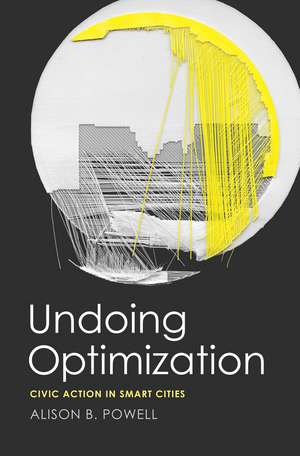Undoing Optimization: Civic Action in Smart Cities
Autor Alison B Powellen Limba Engleză Hardback – 3 mai 2021
City life has been reconfigured by our use—and our expectations—of communication, data, and sensing technologies. In this book Alison Powell examines the civic use, regulation, and politics of these technologies, looking at how governments, planners, citizens, and activists expect them to enhance life in the city. She argues that the de facto forms of citizenship that emerge in relation to these technologies represent sites of contention over how governance and civic power should operate. These sites become more significant as an increasingly urbanized and polarized world faces new struggles over local participation and engagement. The author moves past the usual discussion of top-down versus bottom-up civic action and instead explainshowcitizenship shifts in response to technological change and particularly in response to issues related to pervasive sensing, big data, and surveillance in “smart cities.”
Preț: 170.23 lei
Preț vechi: 211.73 lei
-20% Nou
32.57€ • 35.53$ • 27.47£
Carte indisponibilă temporar
Specificații
ISBN-10: 0300223803
Pagini: 224
Dimensiuni: 140 x 216 x 19 mm
Greutate: 0.42 kg
Editura: Yale University Press
Colecția Yale University Press
Recenzii
“Undoing Optimizationcharts the complex intersections of smart cities and civic action. By deftly examining imaginaries of technological systems and citizenship, Powell contributes an important study in urban optimization.”—Jennifer Gabrys,author ofHow to Do Things with Sensors
"An unflinching critical account of the rise of the ‘optimized city’—of the urban spatial extraction and modeling of data for optimization by private commercial and governmental authorities.”—Louise Amoore, author of Cloud Ethics: Algorithms and the Attributes of Ourselves and Others
“Global upheaval has revealed the fragility and malleability of our urban and communication networks. Alison Powell reminds us that citizens have the power to build new systems embodying progressive politics.”—Shannon Mattern, author ofCode and Clay, Data and Dirt: Five Thousand Years of Urban Media
“This is an essential book for anyone concerned with how cities of tomorrow can work, and who they can work for.”—Mark Graham, coauthor ofThe Gig Economy: A Critical Introduction
Notă biografică
Alison B. Powell is associate professor of media and communication at the London School of Economics and Political Science and is affiliated with the Ada Lovelace Institute.
Descriere
A unique examination of the civic use, regulation, and politics of communication and data technologies
City life has been reconfigured by our use—and our expectations—of communication, data, and sensing technologies. In this book Alison Powell examines the civic use, regulation, and politics of these technologies, looking at how governments, planners, citizens, and activists expect them to enhance life in the city. She argues that the de facto forms of citizenship that emerge in relation to these technologies represent sites of contention over how governance and civic power should operate. These sites become more significant as an increasingly urbanized and polarized world faces new struggles over local participation and engagement. The author moves past the usual discussion of top-down versus bottom-up civic action and instead explains how citizenship shifts in response to technological change and particularly in response to issues related to pervasive sensing, big data, and surveillance in “smart cities.”
